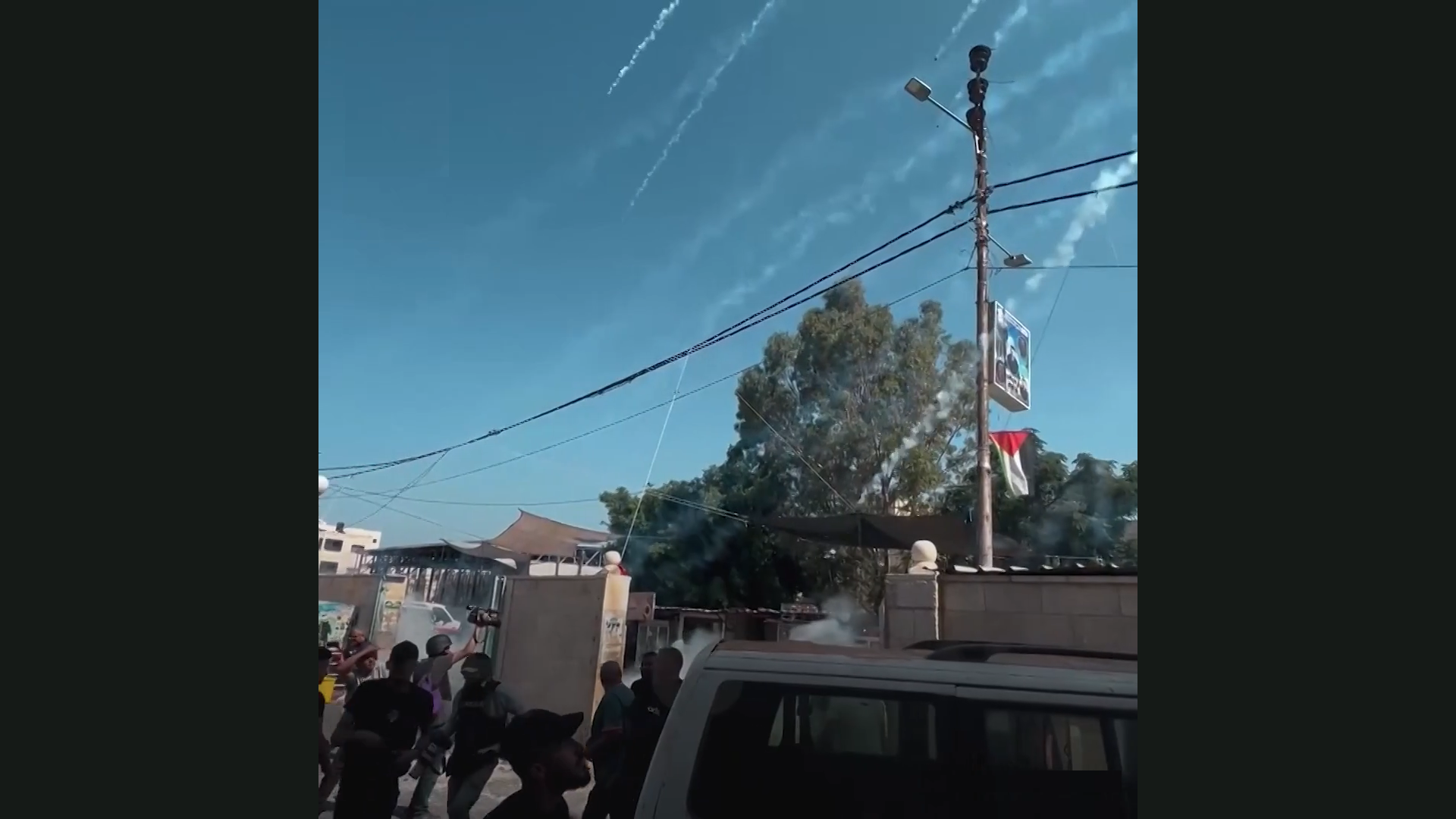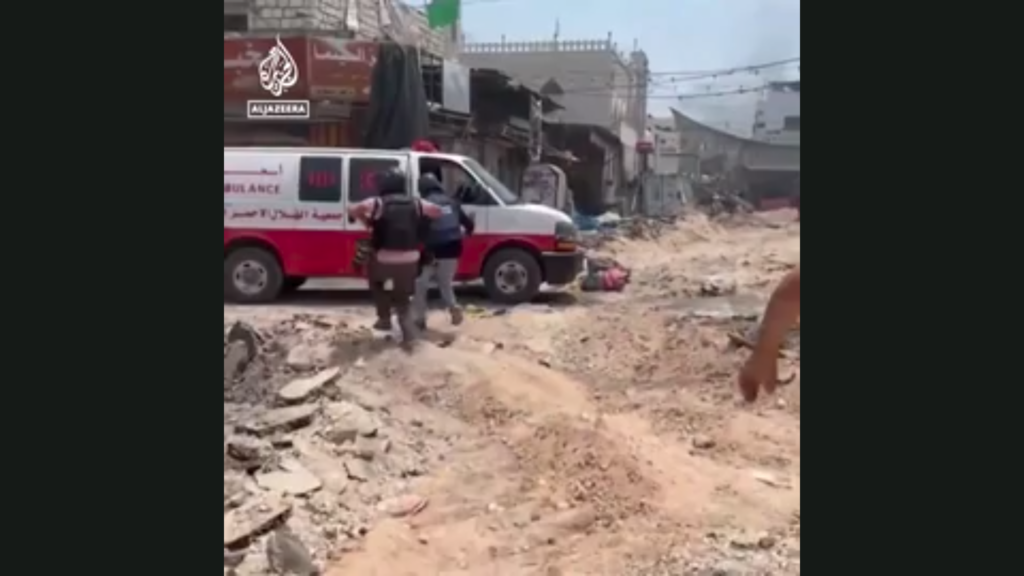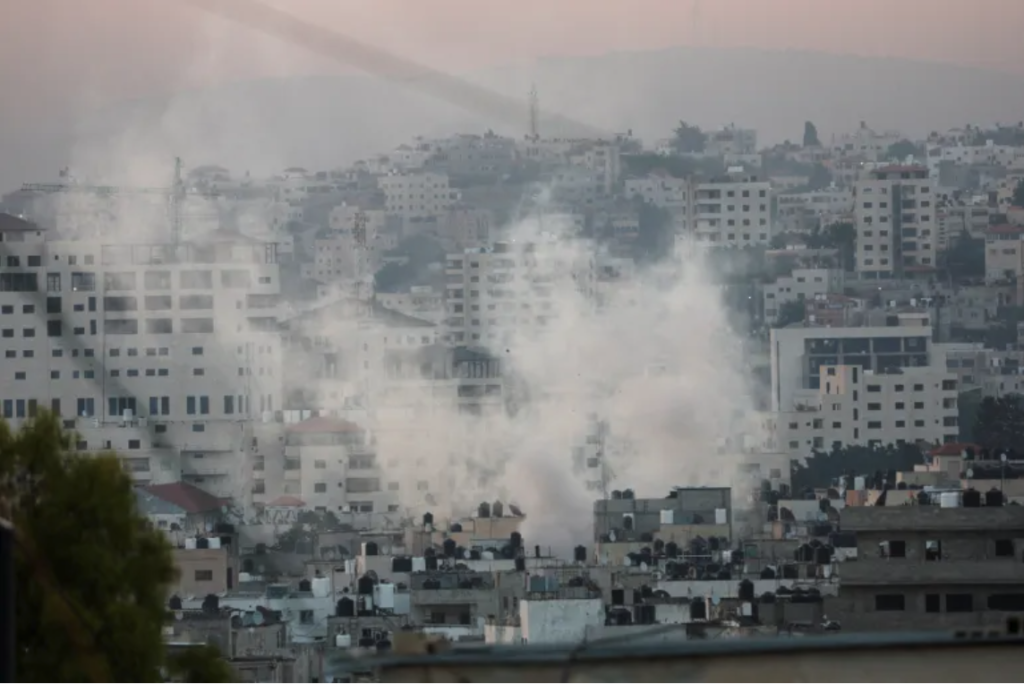
Published 7/4/2023 3:07 PM | Edited 7/5/2023 2:14 PM
Relief agencies have expressed serious concern over the scale of the ongoing Israeli attack on the occupied West Bank city of Jenin and the restrictions imposed on medical access for seriously injured people. Victims are not even able to escape due to blockages.
“We are alarmed by the scale of the air and ground operations taking place in Jenin, in the occupied West Bank, and by the airstrikes hitting a densely populated refugee camp,” Vanessa Huguenin, spokeswoman for the UN humanitarian office, said at a briefing on Tuesday.
She said three minors were among the victims. At least 10 Palestinians have been killed and dozens wounded since early Monday when hundreds of troops, backed by air strikes, stormed the camp in Israel’s biggest offensive in Jenin in more than 20 years.
Read also: UN classifies 2022 as deadliest year for Palestinians
doctors and journalists

World Health Organization spokesman Christian Lindmeier said: “First responders were prevented from entering the refugee camp. [de Jenin]including reaching seriously injured people” due to restrictions imposed by Israeli forces.
The camp is home to over 20,000 Palestinians who are descendants of people dispossessed of their land and homes when the State of Israel was created in 1948.
Bulldozers destroying roads also impede the movement of Médecins Sans Frontières (MSF) ambulances in Jenin. Patients reached on foot by the MSF team were seriously injured by live ammunition and shrapnel.
Israel claimed to be conducting targeted attacks against fighters in Jenin, which has become a symbol of Palestinian resistance, however MSF said it was treating patients of all ages. MSF representatives also say they have never seen such a violent escalation against Palestinians.
Read also: The silencing of voices by Israeli apartheid
Video also emerged showing Israeli soldiers in a military vehicle firing directly at a camera set up by an Al Araby TV crew.
Jonathan Dagher, head of the Middle East Department of Reporters Without Borders, said the shooting was “just an ongoing part of an ongoing situation” in which the Israeli military “intentionally targets journalists in the field while covering any military operation”.
It is not new that journalists are a preferred target. Al Jazeera journalist Shireen Abu Akleh was shot and killed last year.
The veteran reporter was covering an Israeli military attack in Jenin on May 11, 2022, when she was shot by an Israeli sniper, despite wearing a clearly marked press vest and helmet.
Read also: About 600 Palestinians are being held by Israel without charge, says group
Why Jenin?

The Israeli military operation against the Jenin refugee camp is the biggest since the second Intifada of 2000-2005, a mass Palestinian uprising against Israel’s decades-long occupation.
A city in the north of the Israeli-occupied West Bank, Jenin is home to a crowded refugee camp of the same name, with a population of around 14,000 people.
Residents of Jenin camp are descendants of Palestinians dispossessed of their land and homes when the State of Israel was created in 1948.
Jenin has one of the highest unemployment and poverty rates among the 19 refugee camps in the occupied West Bank, according to the United Nations Relief and Works Agency for Palestine Refugees in the Near East (UNRWA).
Jenin has emerged as a flash point during a wave of Israeli-Palestinian violence that has convulsed the occupied West Bank for more than a year. Deadly clashes between Israeli forces and Palestinian fighters in the area have taken place regularly.
Read also: Solemn session in the Chamber remembers 74 years of the Palestinian catastrophe
infrastructure destruction
On Tuesday, Israeli soldiers also threw dozens of tear gas canisters at the entrance to the Jenin Government Hospital, where families who had fled the camp had gathered. Then they invaded the hospital and opened fire, hitting three more people.
Mai al-Kaila, the Palestinian health minister, says the humanitarian situation in Jenin is dire.
“Israel’s aggression against the Palestinians in Jenin is done through the destruction of many infrastructures – the water and electricity network is damaged, especially inside the refugee camp,” al-Kaila said.
“Hospitals are overcrowded with the wounded and some health workers are unable to reach the hospital where they are supposed to work,” she said.
Israel said the aim of its operation was to root out Iranian-backed Palestinian factions behind a wave of gun and bomb attacks, as well as preliminary efforts to build rockets.
Jenin City Mayor Nidal Obeidi compared the Israeli military operation in the occupied West Bank to Nakba. “The humanitarian situation in Jenin is catastrophic,” al-Obeidi said. “What is happening is like an earthquake. It reminds us of the days of Nakba.”
Read also: Government shows solidarity with Palestinians and calls for an end to tensions in the Gaza Strip
Palestinians use the term “Nakba”, or catastrophe, to remember the expulsion of hundreds of thousands of Palestinians from their homes and lands in 1948, after the founding of Israel.
crimes against humanity
A spokesman for Palestinian Authority President Mahmoud Abbas called the operation “a new war crime against our defenseless people”.
The attacks drew condemnation from Iran, Egypt, Jordan and the Arab League, among others, and concern from the United Nations.
Despite this, analysts reckon that economic and commercial interests between Israel and the Abraham Accord are likely to outweigh any moral outrage felt in the states that comprise it – Bahrain, the United Arab Emirates, Sudan and Morocco. But there must be diplomatic pressure to stop Israeli aggression.
Lynn Hastings, the UN Resident Humanitarian Coordinator in Palestine, on Monday expressed deep concern about the targeted air strikes on the camp and said that “access to all the wounded must be ensured”.
Read also: It looked like an earthquake, but Gaza woke up under Israeli bombardment
The UN human rights chief has condemned the cycle of violence in Israel and the occupied West Bank, insisting that the killings and injuries must stop. He equated the violence between the two sides, despite the disproportionateness.
Amid Israeli aggression, there was an isolated attack in Tel Aviv in which a driver caused six deaths in a hit-and-run after carrying out an alleged stabbing attack. The driver was killed at the scene by an armed civilian rescuer.
Hamas identified the suspect as Abdel-Wahhab Issa Hussein Khalayleh, a 20-year-old from Hebron.
“The recent operation in the occupied West Bank and the car attack in Tel Aviv disturbingly underscore a very familiar pattern of events: that violence only breeds more violence,” Volker Turk said in a statement.
“The killing, maiming and destruction of property must stop,” he added.
Read also: ‘Scapegoat’: Palestinians bombed amid Israeli elections
Despite the appeals, the White House National Security Council (US) in a brief statement on Monday said: “We support Israel’s security and right to defend its people against Hamas, Palestinian Islamic Jihad and other terrorist groups.”
“I think we will continue to see – as has happened in the past – the US government covering for the Israelis and letting them do whatever they want,” said Daniel Levy, president of the US/Middle East Project think tank.
Germany’s foreign ministry said it was watching the latest outbreak of violence in the region with “great concern”, but stressed that “Israel, like every state, has the right to defend itself against terror”.
The information is from Aljazira
Source: vermelho.org.br

